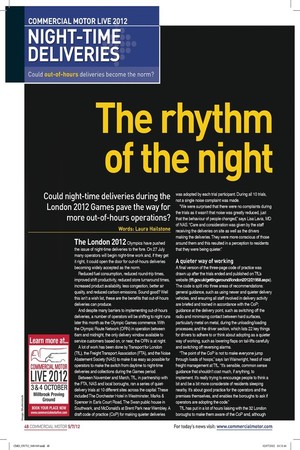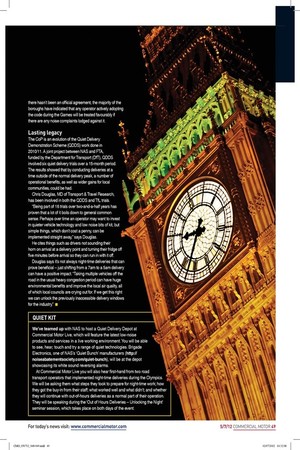The rhythm of the night
Page 39

Page 40

If you've noticed an error in this article please click here to report it so we can fix it.
Could night-time deliveries during the London 2012 Games pave the way for more out-of-hours operations?
Words: Laura Hailstone The London 2012 Olympics have pushed the issue of night-time deliveries to the fore. On 27 July many operators will begin night-time work and, if they get it right, it could open the door for out-of-hours deliveries becoming widely accepted as the norm.
Reduced fuel consumption, reduced round-trip times, improved shift productivity, reduced store turnaround times, increased product availability, less congestion, better air quality, and reduced carbon emissions. Sound good? Well this isn’t a wish list, these are the benefits that out-of-hours deliveries can produce.
And despite many barriers to implementing out-of-hours deliveries, a number of operators will be shifting to night runs later this month as the Olympic Games commence. With the Olympic Route Network (ORN) in operation between 6am and midnight, the only delivery window available to service customers based on, or near, the ORN is at night.
A lot of work has been done by Transport for London (TfL), the Freight Transport Association (FTA), and the Noise Abatement Society (NAS) to make it as easy as possible for operators to make the switch from daytime to night-time deliveries and collections during the Games period.
Between November and March, TfL, in partnership with the FTA, NAS and local boroughs, ran a series of quietdelivery trials at 10 different sites across the capital. These included The Dorchester Hotel in Westminster, Marks & Spencer in Earls Court Road, The Swan public house in Southwark, and McDonald’s at Brent Park near Wembley. A draft code of practice (CoP) for making quieter deliveries was adopted by each trial participant. During all 10 trials, not a single noise complaint was made.
“We were surprised that there were no complaints during the trials as it wasn’t that noise was greatly reduced, just that the behaviour of people changed,” says Lisa Lavia, MD of NAS. “Care and consideration was given by the staff receiving the deliveries on site as well as the drivers making the deliveries. They were more conscious of those around them and this resulted in a perception to residents that they were being quieter.”
A quieter way of working
A final version of the three-page code of practice was drawn up after the trials ended and published on TfL’s website (tfl.gov.uk/gettingaround/london2012/21958.aspx). The code is split into three areas of recommendations: general guidance, such as using newer and quieter delivery vehicles, and ensuring all staff involved in delivery activity are briefed and trained in accordance with the CoP; guidance at the delivery point, such as switching off the radio and minimising contact between hard surfaces, particularly metal on metal, during the unloading/loading processes; and the driver section, which lists 22 key things for drivers to adhere to or think about adopting as a quieter way of working, such as lowering flaps on tail-lifts carefully and switching off reversing alarms.
“The point of the CoP is not to make everyone jump through loads of hoops,” says Ian Wainwright, head of road freight management at TfL. “It’s sensible, common sense guidance that shouldn’t cost much, if anything, to implement. It’s really trying to encourage people to think a bit and be a bit more considerate of residents sleeping nearby. It’s about good practice for the operators and the premises themselves, and enables the boroughs to ask if operators are adopting the code.” TfL has put in a lot of hours liaising with the 32 London boroughs to make them aware of the CoP and, although there hasn’t been an official agreement, the majority of the boroughs have indicated that any operator actively adopting the code during the Games will be treated favourably if there are any noise complaints lodged against it.
Lasting legacy
The CoP is an evolution of the Quiet Delivery Demonstration Scheme (QDDS) work done in 2010/11. A joint project between NAS and FTA, funded by the Department for Transport (DfT), QDDS involved six quiet delivery trials over a 15-month period. The results showed that by conducting deliveries at a time outside of the normal delivery peak, a number of operational benefits, as well as wider gains for local communities, could be had.
Chris Douglas, MD of Transport & Travel Research, has been involved in both the QDDS and TfL trials.
“Being part of 16 trials over two-and-a-half years has proven that a lot of it boils down to general common sense. Perhaps over time an operator may want to invest in quieter vehicle technology and low noise bits of kit, but simple things, which don’t cost a penny, can be implemented straight away,” says Douglas.
He cites things such as drivers not sounding their horn on arrival at a delivery point and turning their fridge off five minutes before arrival so they can run in with it off.
Douglas says it’s not always night-time deliveries that can prove beneficial – just shifting from a 7am to a 5am delivery can have a positive impact. “Taking multiple vehicles off the road in the usual heavy congestion period can have huge environmental benefits and improve the local air quality, all of which local councils are crying out for. If we get this right we can unlock the previously inaccessible delivery windows for the industry.” ■
QUIET KIT
We’ve teamed up with NAS to host a Quiet Delivery Depot at
Commercial Motor Live, which will feature the latest low-noise products and services in a live working environment. You will be able to see, hear, touch and try a range of quiet technologies. Brigade
Electronics, one of NAS’s ‘Quiet Bunch’ manufacturers (http:// noiseabatementsociety.com/quiet-bunch), will be at the depot
showcasing its white sound reversing alarms.
At Commercial Motor Live you will also hear first-hand from two road transport operators that implemented night-time deliveries during the Olympics. We will be asking them what steps they took to prepare for night-time work; how they got the buy-in from their staff; what worked well and what didn’t; and whether they will continue with out-of-hours deliveries as a normal part of their operation. They will be speaking during the ‘Out of Hours Deliveries – Unlocking the Night’ seminar session, which takes place on both days of the event.










































